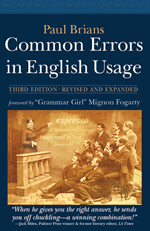If your writing contains numbers, the general rule is to spell out in letters all the numbers from zero to nine and use numerals for larger numbers, but there are exceptions. If what you’re writing is full of numbers and you’re doing math with them, stick with numerals. Approximations like “about thirty days ago” and catch-phrases like “his first thousand days” are spelled out. Large round numbers are often rendered thus: “50 billion sold.” With measurements, use numerals: “4 inches long.” Never start a sentence with a numeral. Either spell out the number involved or rearrange the sentence to move the number to a later position.
Many style manuals apply the same rule to what are called “ordinal” numbers, like “first,” “second,” “fifth.” Following this pattern, higher numbers spelled as numerals begin with “10th” and go on through numbers like “22nd” and “114th.” But dates are usually rendered in numerals even if they are small. It’s normally “July 4th” and “the 4th of July,” though few people would object to “Fourth of July.” The only reason to worry about this is if you are writing for an editor or teacher who has a particular preference for one of these patterns. You are more likely to get in trouble if you use numerals for small numbers than if you use spelled-out forms for large numbers: “my 1st trip to France“ looks bad to more people than “the seventy-fifth time I’ve told you to take out the trash.” And large round ordinal numbers are almost always spelled out: “the hundredth issue published,” “the thousandth ticket sold,” “the millionth visitor to the park.”
BUY THE BOOK!
